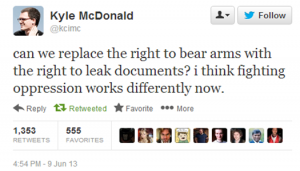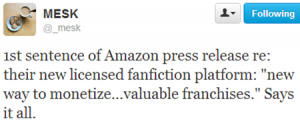Though people have been quick to break out Orwell and Big Brother in response to NSA PRISM, legal scholar Daniel Solove “suggested a different metaphor to capture the problems: Franz Kafka’s The Trial, which depicts a bureaucracy with inscrutable purposes that uses people’s information to make important decisions about them, yet denies the people the ability to participate in how their information is used“ (quoted in Rebecca Rosen’s Atlantic piece).
This is to say that activities and acquaintances and phone calls and blog posts that seem harmless to us can be taken out of context, algorithmically processed in ways we don’t know about and can’t dispute, (indeed, since senators apparently skip briefings from the intelligence agencies, ways Congress doesn’t even know about and can’t dispute) and voila, we’re on the No-Fly list. (Something which, to be honest, I’ve considered as I’ve been doing this blogging.)
Jan Fernback made a similar point at Culture Digitally: “We have no knowledge of how governments and corporations are constructing our ‘data selves,’ and this fact militates against trust, civil liberties, and a general ethical sensibility. We have reason for suspicion when, in such a malevolent surveillance context, we have no assurance that data will not be abused.”
Even Supreme Court Justice Breyer has taken this stance in one of his opinions, which Wired quoted as pointing out that it’s “difficult for anyone to know, in advance, just when a particular set of statements might later appear (to a prosecutor) to be relevant to some such investigation.”
Of course, as David Cardinal writes at ExtremeTech the claim is “that the act of logging data is not the same as actually looking at it.” That is, the federal government doesn’t have perfect surveillance of all things you do at all times; they only collect everything and then go back and check it if they have a reason to be suspicious.
Though Stanford Center for Internet and Society Director of Civil Liberties Jennifer Granick found the claim not to target unconvincing and wanted to know about monitoring, I think the legal dodge of blanket surveillance is actually genius because it lets them claim that they don’t “target” OR “monitor” Americans without probable cause but still have total access to look at what they’ve logged at any point.
Solove went on to say that “the NSA program involves a massive database of information that individuals cannot access. Indeed, the very existence of the program was kept secret for years. This kind of information processing, which forbids people’s knowledge or involvement, resembles in some ways a kind of due process problem,” and that framing as due process caught my attention.
That is, the problem of PRISM may be best understood not solely against the 4th Amendment:
Amendment IV
The right of the people to be secure in their persons, houses, papers, and effects, against unreasonable searches and seizures, shall not be violated, and no Warrants shall issue, but upon probable cause, supported by Oath or affirmation, and particularly describing the place to be searched, and the persons or things to be seized.
but also as impinging on the 5th amendment:
Amendment V
No person shall be held to answer for a capital, or otherwise infamous crime, unless on a presentment or indictment of a Grand Jury, except in cases arising in the land or naval forces, or in the Militia, when in actual service in time of War or public danger; nor shall any person be subject for the same offence to be twice put in jeopardy of life or limb; nor shall be compelled in any criminal case to be a witness against himself, nor be deprived of life, liberty, or property, without due process of law; nor shall private property be taken for public use, without just compensation.
(Full Bill of Rights at Archive.gov)
Posing this as a due process question could be the way to get some traction in light of the nonchalance about privacy discussed last week: The problem with NSA PRISM is that we are all being treated as guilty until proven innocent. This has been going on since 9/11, of course, with airport security being one highly visible iteration, but there’s a chance that this new level of awareness of just how much everyone is being treated as criminal without due process of law could be the straw.
Solove describes the stakes well: “Even if a person is doing nothing wrong, in a free society, that person shouldn’t have to justify every action that government officials might view as suspicious. A key component of freedom is not having to worry about how to explain oneself all the time.”
Crossing this line into blanket assumption of guilt is what animates the Stop Watching US petition, which says “the contents of communications of people both abroad and in the U.S. can be swept in without any suspicion of crime or association with a terrorist organization,” though they tie their concern to the 1st and 4th amendment and “citizens’ right to speak and associate anonymously, guard against unreasonable searches and seizures, and protect their right to privacy” without mentioning due process.
(That people feel due process has gone out the window is clear from the fact that RootsAction sent me a petition to President Obama “not to engage in any abduction or other foul play against Snowden,” ironic when the administration’s line on why they’re disappointed that Hong Kong let him leave is that they want there to be rule of law.)
Wired perhaps elaborates the worst-case-scenario best: “Police already abuse the immense power they have, but if everyone’s every action were being monitored, and everyone technically violates some obscure law at some time, then punishment becomes purely selective. Those in power will essentially have what they need to punish anyone they’d like, whenever they choose, as if there were no rules at all.”
Of course, black and Latino citizens have been living under presumed-guilty, surveilled-within-an inch-of-their-lives, selectively-punished conditions for decades: they’re more likely to get caught at things white folks also do and be punished more harshly for them, even as early as middle school (see Ann Ferguson’s Bad Boys). Muslim and Arab citizens have been living under it since 9/11.
David Simon is absolutely right to point out the hypocrisy that “when it’s time for all Americans to ante in with the same, exact legal intrusion to their privacy, the white folks, the middle-class, the affluent go righteously, batshit, Patrick-Henry quoting crazy” whereas those same people think that:
thousands of Baltimoreans, predominantly black, can have their data collected for weeks or months on end because they happened to be using a string of North Avenue payphones, because they have the geographic misfortune to live where they do. And it’s the same thing when it’s tens of thousands of Baltimoreans, predominantly black, using a westside cell tower and having their phone data captured. That’s cool, too. That’s law and order, and constitutionally sound law and order, at that.
Rather than rolling out presumed-guilty to everyone, the revelation of NSA PRISM provides an argument for rolling it back altogether. Not being deprived of liberty without due process of law is fundamental. It’s in the constitution.
So it’s time to look hard at what we’re willing to accept in the name of security, to go back to ends and means again. And if we’re going to allow there to be surveillance of any magnitude, the question of due process seems like an excellent place to start


